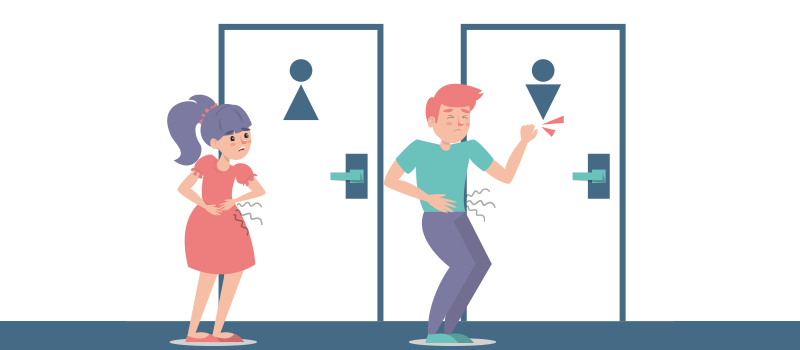What’s the Buzz
The Bee Healthy Blog
What to Eat When You Have Diarrhea

If you have diarrhea, which is defined as loose, watery stools that are more frequent than usual, it’s a good idea to eat certain foods that relieve diarrhea and avoid others that worsen symptoms. Please continue reading to find out more.
What causes diarrhea?
The term diarrhea refers to loose and frequent bowel movements. Most people experience diarrhea several times in their lifetime, sometimes multiple times a year.
Diarrhea can occur due to a parasitic, viral, or bacterial infection of the digestive tract (acute gastroenteritis or stomach flu); side effects of medications such as antibiotics; health conditions such as lactose intolerance; digestive disorders such as irritable bowel syndrome (IBS), inflammatory bowel disease (ulcerative colitis, Crohn’s disease); and eating disorders.
Some people experience diarrhea and other symptoms like bloating, gas, nausea, vomiting, and constipation because they have a sensitive digestive system that reacts to certain foods.
How to treat diarrhea?
Most of the time, diarrhea clears on its own without treatment. However, sometimes it is necessary to take antibiotics or antiparasitic medications for managing acute gastroenteritis. Your doctor will also advise you to drink plenty of fluids to prevent dehydration (every loose bowel movement results in fluid loss).
Eat small, frequent meals throughout the day instead of two or three large meals to avoid making diarrhea worse. If you take a fiber supplement, stop taking it until your diarrhea is better.
Your provider may adjust your medications if your diarrhea is a side effect of drug therapy. Treatment for underlying conditions, such as irritable bowel syndrome or inflammatory bowel disease, can also provide relief from diarrhea.
Last but not least, eating certain foods that control diarrhea and avoiding other foods that worsen diarrhea can help to reduce diarrhea symptoms.
What foods help diarrhea go away?
The main goal of a diarrhea-friendly diet is to keep it simple. The aim should be to eat a bland diet, low-fiber diet, and low FODMAP diet, which includes bland foods, soft foods, and foods that are easy to digest. This gives your digestive system and gut health a chance to recover.
BRAT Diet
Experts in digestive and kidney diseases recommend the BRAT diet (bananas, rice, applesauce, toast). BRAT foods help to manage diarrhea in many ways. Bananas help in firming up loose stool and replacing electrolytes like potassium that are lost with diarrhea. Rice (preferably white rice) is easy on the stomach. Also, low-fiber foods like white rice are less likely to stimulate your bowels. Unsweetened applesauce is a good source of soluble fiber like pectin, which acts as a binder and adds bulk to your stools. Applesauce is also a good source of energy and is generally well tolerated. Toast (preferably white bread) is low in fiber, easy to digest, and soothing for the stomach.
For variety, you can also eat bland foods like dry cereal (cornflakes), oatmeal, refined white flour (pasta, pancakes, waffles, cornbread), baked or boiled potatoes (skinless), small portions of cooked vegetables (carrots, beans, mushrooms, green beans), salty snacks (pretzels, crackers), low-fat yogurt (it contains probiotics or good gut bacteria), baked chicken with the skin removed, and desserts like jelly, ice pops, and sherbet.
What can I put on my toast when I have diarrhea?
You can put sliced ripe bananas, unsweetened applesauce, peanut butter, or boiled eggs on your toast when you have diarrhea.
Is egg good for diarrhea?
Eating well-cooked eggs without oil or butter, for example, boiled eggs may help to slow digestion and help with diarrhea. However, you should limit protein intake until your diarrhea clears.
What should I drink when I have diarrhea?
When you have diarrhea, you lose fluids with watery bowel movements. It is, therefore, important to drink plenty of water to replenish lost fluids and prevent dehydration. Aim for one cup of water (240 mL) after every episode of loose stools. Other beverage options when you develop diarrhea include electrolyte drinks or sports drinks (Gatorade, Pedialyte), chicken noodle soup, kefir (a fermented milk-based drink), fruit juices (apple, cranberry, grape), decaffeinated tea, and coconut water.
What foods make diarrhea worse?
Foods that can make diarrhea symptoms worse include fatty foods, fried foods, spicy foods, high-fiber foods that contain insoluble fiber (whole grains, fruits and vegetables including green leafy vegetables, legumes, and nuts), milk and dairy products, citrus fruits (oranges, lemons, limes, grapefruits), and sugary foods including foods containing artificial sweeteners. Carbonated drinks, caffeinated beverages, and alcohol can also make digestive symptoms like diarrhea worse. Avoid drinking dairy products until your diarrhea clears.
How long after diarrhea can you eat normally?
You should go back to eating a normal diet 24-48 hours after you develop diarrhea symptoms. Remember, the BRAT diet is a temporary measure to relieve diarrhea. It can be eaten for 1-2 days to reduce diarrhea symptoms when you have occasional diarrhea, but it is not a nutritionally adequate diet to be eaten long-term.
When to see a doctor for diarrhea?
You should call your doctor if you have:
-
Severe diarrhea (more than 10 loose stools in 24 hours)
-
Persistent diarrhea that lasts more than 2 days despite eating bland foods and/or taking over-the-counter anti-diarrheal medications
-
Severe pain in the abdomen or rectum
-
Vomiting blood or blood in stool
-
Dry mouth, dry skin, excessive thirst, reduced urination, dark urine, weakness, and dizziness (signs of serious complications like dehydration)
-
Also, talk to your doctor about dietary modifications if you are lactose intolerant and have chronic diarrhea.
References:

SOCIAL